#Tools for Conviviality
Text

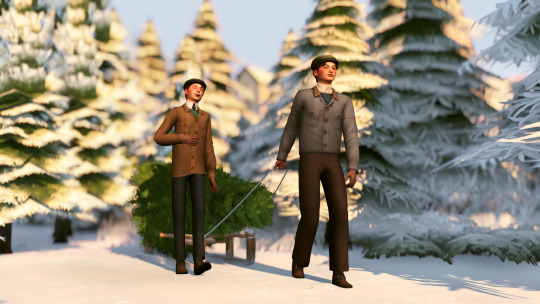








Christmas 1911
The holiday season at Sable Dairy was always a jolly, convivial time, with plenty of good food and fun to be had. Freddy's return from Britechester brought with it an increased energy and desire to make the most of the holiday.
The boys were tasked with finding and securing the perfect Christmas tree; selecting a fine fir from the small copse behind the farm. The assistance of a sledge was needed to drag it home, but once inside and garnished with a festive popcorn and cranberry garland it took up a dazzling countenance tucked up against the stair. The card table that usually sat there banished to the attic for the time being.
It would be a lie to say that none of the Sewells had a sweet tooth, and so a flurry of holiday baking was accomplished by both Violet and Elsie. Elsie, having recently discovered both a passion and talent for baking, had been allowed to build the annual gingerbread house unsupervised (with some assistance from Charlie). To Violet's delight, none of the pieces were broken, and only one had some small tooth marks that she was studiously ignoring.
A fine meal of roast ham, potatoes, vegetables, mince pies, and Christmas puddings was made by Violet. The family exclaimed that it was the best they had eaten yet; leftovers were scarce, despite the magnitude of the meal.
Under the tree, the collection of presents the family had gotten for one another was wrapped gaily in bright papers and festooned with ribbons. Will's present to Elsie was front and center; a wrapping job foregone due to the awkward shape and size. The small pram he had built, but the little mohair bear, the latest fad toy for young children, he had ordered himself from the Sims Roebuck Catalog, paying the fees with the money he had begun saving from the farm work and odd jobs he did. He had been right; the smile on her face had been completely worth it.
Violet received a teapot in a stylish new pattern. Charlie was gifted a wooden train set, each car hand carved by Will and the functional track built by Hamish. The bright paint job, with wheels that resembled the peppermint sweets Nathanial gave each of his grandchildren, was all by Violet's precise hand. Elsie received a new dress from her mother and father, with bright red embroidery and a snowy white collar; she donned it immediately. Hamish found a box of cigars under the tree with his name on them, but with a strict reminder from Violet not to smoke in the house. For Will, Hamish had purchased a sturdy and expansive tool kit, and for Freddy, a fine leather attaché to hold his school papers and a beautifully crafted fountain pen.
The day was long and filled with excitement and good times. The family perhaps stayed up later than they should, all except one that is. His father, once realizing his torpor, carried Charlie to his bed, where his dreams were full of trains made of gingerbread and passengers that bore striking resemblances to Christmas puddings.
~~~~~~~~~~~~~~~~~~
next / previous / first
#its Christmas in july everyone!!#i swear one of these days my in game season will match up irl....#ts4 decades challenge#sims 4 decades challenge#ts4 legacy#ts4 storytelling#sims 4 legacy#sewell legacy#william sewell#frederick sewell#elizabeth sewell#charles sewell#hamish sewell#violet sewell#sewell 1910s
106 notes
·
View notes
Note
someone on twitter made a succession incest supercut and i was wondering if you had any thoughts on how articulations of incest shape the roys esp wrt roman. the op of that also remarked on how succession plays into the incestuous dimensions of aristocratic nobility which i thought was interesting.
yeah i wrote a bit about roman and incest specifically here. tl;dr: he has a negative oedipus complex, ie subconscious desire for the father, which is part of the show's overall suggestion that the structure of the family (because it is embedded within the structure of capitalism) inherently creates this type of desire and therefore also enables certain forms of abuse and violence. ie, roman's attraction to father figures, resulting from his unconscious desire for his own father, is not an aberration from the 'typical' functioning of the family, but a heightened expression of the parent-child relationship as it normatively exists. logan's possessiveness over roman's sexual desires and disgust at his body and effeminacy; roman's attraction to women his father finds attractive; the way logan tacitly relies on roman's flirtatiousness when sending him as an emissary to various powerful businessmen; roman's desire for gerri to repeat the sorts of insults his father uses against him in their sexual encounters, and roman eventually firing her when she can't look him in the eye and tell him he's as good as logan was: in all of these we can see how the patriarchal father is a role inherently defined by possession of the wife and children, stymieing the child's sense of identity and ability to differentiate himself from the parent.
in the case of logan and roman, of course, these dynamics are elevated, because this is tv and the writers are using their relationship to draw out the elements of violence and coercion that the father role inherently rests on; also, because logan uses his outrageous wealth and social power as tools against his children, as the other half of the critique here is in pointing out that the capitalist family is an economic arrangement first. logan's children have always existed to be employees, and on a broader level, reproduction is what capitalism uses the family for: it's the site at which a supply of new and able workers is to be ensured. so, the incestuous desires roman has for logan, and the way logan controls him and treats him as a combination of son-daughter-wife, is meant to tease out the way in which these elements are inherently always present in the family. there's no break here between the roys and 'normal' families; there's only a difference of intensity and degree of overtness.
similar analyses can and should be made for the other roy children. shiv and kendall have a patricidal drive that roman does not, and they both desire affection from caroline; roman, on the other hand, identifies with the wife role more, and thus has a degree of conviviality with caroline that shiv and kendall have never had access to. but there are incestuous elements to their relationships with logan as well, partly because in the show's discursive field, killing is always equivalent to fucking is always equivalent to succeeding, and partly through the degree of control and coercion that logan also uses with them. parental possessiveness (eg, the control logan exerts over kendall in s2, or his demands for shiv to perform affection for him publicly) frequently appears continuous with, or as a parallel to, abusive treatment of a spouse; think also of kendall taking on the role of managing logan's pills, or saying he doesn't know what he would be [good] for if not for logan. connor has been discarded much like his mother (presumably for sharing her non-noble bloodline and potentially, in logan's mind, her psychiatric diagnoses).
thus, in all of the relationships between logan and his children, we see how 1) parent-child is inherently a violent and coercive dynamic, and 2) specifically, the nature of the family as a contained sphere of capitalist production means that the child's psychosexual development occurs through the relationships to the parents, which inherently invites some degree of incestuous desire and abuse, and, given certain circumstances, can result in adult children who never move past these stages of development and retain their juvenile incestuous desires and fixations.
the way that the roys talk to one another frequently involves incestuous sub/text and sexually violent threats or metaphors. this accomplishes a few things. first, because their family is part of waystar, the violence that waystar perpetrates (the cruises scandal, the wolf pack, capitalism's broader ab/use of labourers' bodies) trickles down into the family's mode of communication as well. second, although they're not speaking literally when they talk like this, often they are expressing something emotionally true (ie, roman seeing 'getting fucked by dad' as a good thing tells us that roman sees himself as the bottom of the sexual and social hierarchy, that this position makes him vulnerable, and that he does still desire it, which again is because of his attraction to dominant father figures and hypermasculinity). third, again, it's part of how they convey that 'normal' capitalism is violent, 'normal' families are part of capitalist production and therefore also violent, and 'normal' family dynamics are pseudoincestuous (which, obviously, can and does elevate into literal physical incest).
and yes, there is also the incestuous dimension of aristocratic 'breeding' practices, which comes to the fore when matsson jokes that the roys are like the habsburgs, but also like "one of those incestuous family cookouts". in that line, he's playing off the fact that although the roys resemble a medieval or early modern royal dynasty in some ways, they're very much new money, and are insecure about this fact; he's suggesting that they're more like a 'backwater' rural incestuous family than the habsburgs, and that the habsburgs themselves were a bit gross and pathetic for their incestuous bloodline. this fits in with matsson's fixation on biological strength and fitness (his team is specifically young, stacked with olympic hopefuls and fulbright scholars; he flashes his abs to demonstrate his normatively 'correct' body in a business deal; even sending his blood and hair to ebba is specifically an intimidation tactic that doubles as a demonstration of his own strength and uses his body to subordinate his ex-girlfriend; he later calls greg "backwash in the shallow end of the gene pool"; all of this eugenic discourse is of course also contextualised by his racism / white nationalism, as shown in the line about "arabs in france").
but, outside of the context of matsson, i think the critique of the family is a more interesting use of incestuous subtext on succession, honestly. this is where the show actually does have something interesting to say in its typically snarky and satirical way. the family is not just continuous with capitalist production, but is a microcosm of it and a site on which capitalism articulates, and the inherently incestuous elements of the family are thus metonymic of larger structures of violence in capitalism. there is nothing perverse or abnormal about the roys; their abuse of one another, and their incestuous internal dynamics, are the expected outcome of normal capitalist functioning, specifically through the family unit.
117 notes
·
View notes
Text
Degrowth has several intellectual taproots: One, André Gorz’s eco-socialism. Two, Ivan Illich’s call for convivial tools, premised on interaction amongst people as opposed to technologies based on the raw productivity of machines, and in many ways a non-Marxist account of alienated production. And three, Nicholas Georgescu-Roegen’s work on entropy, or how the process of making things has an innate tendency to take order—that of ore, or hydrocarbons, or a sustainable eco-system—and sow disorder: ore scattered into a million granules of metal, burnt oil becoming carbon dioxide, and an eco-system degrading amidst the poisonous infiltration of wastes produced by coal and metal mining and processing, never mind a warmer world to which it was unaccustomed. We might see Gorz as a call for distributive fairness and a just economy in the now, Illich as a non-Marxist call for unalienated social and productive interactions, and Georgescu-Roegen as a call for fairness, equity, lack of exploitation, and accountability, not to those living now on earth, but for those generations yet to come. Degrowth creatively fuses them, although with a certain de-emphasis of capitalism’s logic of accumulation, while borrowing from French-American technology criticism a heavier emphasis on the physical-technical elements of the social formation.
Max Ajl, Degrowth Considered
53 notes
·
View notes
Text
Reading list Jan-24
Books
Frolic of the beasts by Yukio Mishima
tools for conviviality by Ivan Illch
Notes of a Native Son by James Baldwin
In The Company of Men by Veronique Tadjo (you can find my review here)
Only People Make Their Own History by Samir Amin
Eric Hobsbawm: A Life in History by Richard J. Evans
Papers/articles!
Letter: On Academic Marxism, “The Masses,” and Bourgeois Nationalism - Cosmonaut (cosmonautmag.com)
International Financial Centres as Channels for Foreign Investment Inflows to Europe by Bulatov, Habarta and Sergeev
Robin Blackburn, Crisis 2.0, NLR 72, November–December 2011 (newleftreview.org)
Robin Blackburn, The Subprime Crisis, NLR 50, March–April 2008 (newleftreview.org)
Financialization, Financial Elites, and the Changing Genres of
Financial and Banking History by Simon Mollan
#studyblr#studying with k#studyingwithk#books#academia#studying#desi dark academia#dark academia#bookblr#reading list#study#study aesthetic#readingrecs#mymonthlyreads#clown college
6 notes
·
View notes
Note
4,6,9,24 and 40 for the ask game my lovely dark friend 🖤
Hello my dear Dark Queen🖤
Thank you for your asks!
4. what’s an inside joke you have with your family or friends?

After inadvertently sitting on a 'fragile, please handle with care' label, I took my children to school. Then on my return, my partner said he approved of what was written on my bottom before removing one of the fucking labels. Instant of mortification realizing how many people have seen that on my bottom!!! but now the word 'fragile' is our code for pointing out a problem with our outfit for good reason or…as a joke. 😈
6.what’s the best and worst part of being online/a creator?
The process of publishing and engaging with nice people who share similar interests and are in a spirit of sharing and conviviality. Additionally, I love discovering the creative processes of those whose works I appreciate, or their perception of a character.
Despite my strict conception of a safe space, having an online presence sometimes entails exposure to potential unpleasant or malicious behaviours. This triggers negative emotions in me such as insecurity, frustration, disgust, disdain, or rejection. Furthermore, I make no excuses for these behaviours because I believe that if someone is mature enough to be on social networks, they are mature enough to know how not to be a jerk. That said, if this is the aspect of their personality they want to show to the world, so be it, but I am not obliged to endure it, and I will organise my online experience accordingly.
9.tell a story about your childhood
Okay… One time, I was poking around my grandfather's workshop and I found a can of neon pink spray paint that he'd used to mark trees for cutting. A dream for any kid! 🤩And the old greasy workshop, full of old and not so old tools, needed redecorating from my point of view. From nails to chainsaws, workbenches, vices, spanners, drills, sledgehammers, axes and walls. Everything in the workshop got a girly touch, but my grandparents didn't appreciate my creativity. 🤣

24. what’s one thing you’re proud of yourself for?
My professional and personal career.
40. any bad habits?
I curse regularly, sometimes in quite a creative manner.😅
5 notes
·
View notes
Text

L'urgenza di salvare l'umanità è quasi sempre il dito dietro cui si nasconde l'urgenza di dominare l'umanità. Quindi, come regola generale, salva prima le persone vicine a te. Inizia con te stesso.
Ivan Illich, Tools for Conviviality, 1973
9 notes
·
View notes
Text
overengineered coffeemakers are so fucking funny. the one at work with the 22" screen that plays stock video of harvest in the coffee fields while it's brewing has had a "grinder issue" for over a week (and honestly girl same but that's not the point) and like... you will NEVER. be. a bunn drip carafe. those things can boil water for 80 uninterrupted years i want one so bad. i want an old stained to hell one from a roadside diner or a motel with "continental" breakfast honestly (as if those croissants would ever fly on the continent, which is supposedly europe, also not the point). what's the word for a tool that has one and only one purpose? i want to say convivial and like that's not emotionally wrong but it's also maybe not the specific word i was trying to think of
18 notes
·
View notes
Text
Tommy Two-shoes
This.....when credibility suddenly collapses.
"Let me quote my favorite Marxist Jesuit, Ivan Illich, from his book "Tools for Conviviality:"
"Some fortuitous coincidence will render publicly obvious the structural contradictions between stated purposes and effective results in our major institutions. People will suddenly find obvious what is now evident to only a few . . . Like other widely shared insights, this one will have the potential of turning public imagination inside out. Large institutions can quite suddenly lose their respectability, their legitimacy, and their reputation for serving the public good. It happened to the Roman Church in the Reformation, to royalty in the Revolution. The unthinkable became obvious overnight: that people could and would behead their rulers." (Illich's "Tools", p. 111)
3 notes
·
View notes
Text

"L'urgenza di salvare l'umanità è quasi sempre il dito dietro cui si nasconde l'urgenza di dominare l'umanità. Quindi, come regola generale, salva prima le persone vicine a te. Inizia con te stesso."
Ivan Illich (1926-2002), Tools for Conviviality, 1973
Giuseppe Masala
5 notes
·
View notes
Text
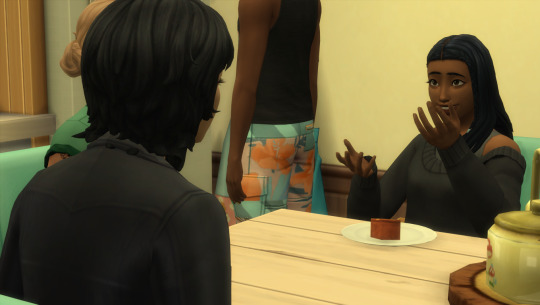

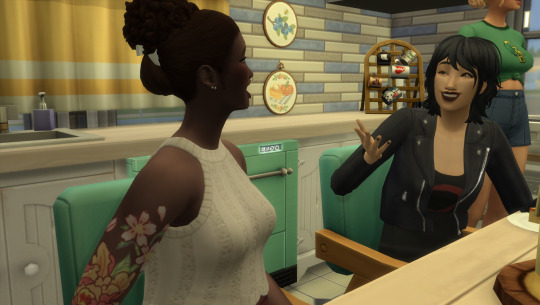
Cam then met Piper’s moms, and baby cousin Emily. She already met Hamuera at the party, and he shyly said hi to her before heading off to his room. Emily, who was usually loud and goofy, was unusually quiet. Piper glanced at her, and noticed that she blushed as Cam said that Piper had told her about how Emily played soccer, and that Cam used to play as well. Piper smiled and thought it was kind of cute that Emily had a crush, and decided to tease her about it later.
In Emily’s mind, she just felt weird as heck. As soon as Piper and Cam had walked in and Cam said hi to her, Emily felt like her face was turning red and her heart was beating faster and her hands were getting clammy. She wondered if it was some kind of bug, like the cold that was going around in her class three weeks ago. She hoped not, since she wanted to be able to play with her soccer team and all.
While Emily then started talking with Piper, Chrissy turned to Cam. “So, what do your parents do, Cam?” She asked. “Well, my dad is a writer by day and fancy cook in our house by night.” Cam added, smiling. “And my mom owns a hardware store in Copperdale. She also helps build sets for the local theater and she has her degree in engineering so she does odd jobs or consulting.” She said. “Okay, that’s pretty cool.” Chrissy said, smiling. “What about you?” She asked. “Currently, I’m in the chess club at Copperdale, and I help my mom in the store sometimes, plus she taught me how to build and fix stuff so anytime one of our relatives have an issue, my mom tells them to let me check it out as if I’m a pro, but honestly all I do is turn stuff on or off, or use my tools to fix some random thing.” Chrissy laughed. “Plus.” Cam added. “My dad and I take woodshop classes some saturdays at the rec center, and I built a wonky but useable chair.” Chrissy grinned. “If you’re trying to impress me, it’s working.” She joked. Cam laughed too. “I am, honestly, Mrs. Hecking-Feldman.” She said. “You can call me Chrissy.” Chrissy said. “And I understand, when I started dating Piper’s mom Luna, I was so nervous to impress her moms, and I’ve known them since I was a toddler.” She added convivially. “But anyway, it’s really great to meet you, Cam. I can see why Piper talks about you so much.”
Piper overheard this and said, “Mama, honestly.” And blushed. “What does she say about me?” Cam asked, giving Piper a mischievous smile. “There’s so much.” Chrissy said as Piper covered her face with her hands. “But one time, I took Piper shopping and as soon as she saw a 90s style black t shirt, she sighed and said, ‘This is just like something Cam would wear.’ And had such a moon eyed expression. She really likes you.” Piper groaned as Cam laughed and her mama grinned. Cam felt kind of bad that Piper had to be embarrassed alone, so she added. “Well, my mom and dad keep saying that I talk about Piper a lot too.” Piper grinned at her this time. “Anything specific?” She asked teasingly. "No, but according to them I keep bringing you up. Like Piper said or did this, and when my sister Cecilia talked about San Myshuno U, I brought up that you take art classes there." She said. Piper smiled at this.
4 notes
·
View notes
Photo



Starlight Awards Theater
Lounge located at the Studio PBP lot in Del Sol Valley
Hottest Spot in Town | Convivial
No CC, Yes MOO and TOOL
Gallery ID: Azealea
I’ve been itching to rebuild Studio PBP for a while, much like all of the builds in Del Sol Valley. This one though, is very important for your celebrity sims if they are looking to go to the Starlight Accolades and receive awards.
This lot features a bouncer at the front door to prevent anyone who isn’t a celebrity form entering the lounge. Those camera hounds can stay outside! The first floor has a classy gold themed bar area and a massive auditorium. In the auditorium you will find a grand piano and TWO microphones. Why two? Because a cleb can be receiving their award at one while the host continues the show at the other -- which means you get through more awards every Sunday night.
The second floor contains two exclusive celebrity changing rooms and restrooms for those sims who need to do some extra make-up touch-up before the show.
The theater is fully play tested and functions as an award receiving area and a lounge as intended. Built using move objects on and T.O.O.L. Also, many packs.
Have fun!
14 notes
·
View notes
Text

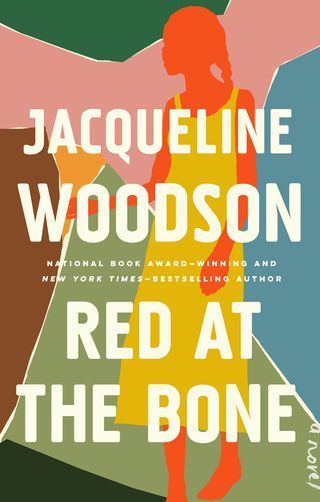
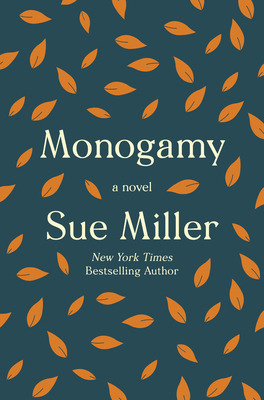

NoveList Combos: Character Driven & Thoughtful
Did you know NoveList is a database you can access with your library card to find reading recommendations? Find your next favorite read with this fantastic readers tool! Check it out on our website here.
Swing Time by Zadie Smith
Two brown girls dream of being dancers—but only one, Tracey, has talent. The other has ideas: about rhythm and time, about black bodies and black music, about what constitutes a tribe, or makes a person truly free. It's a close but complicated childhood friendship that ends abruptly in their early twenties, never to be revisited, but never quite forgotten, either.
Dazzlingly energetic and deeply human, Swing Time is a story about friendship and music and stubborn roots, about how we are shaped by these things and how we can survive them. Moving from northwest London to West Africa, it is an exuberant dance to the music of time.
Red at the Bone by Jacqueline Woodson
As the book opens in 2001, it is the evening of sixteen-year-old Melody's coming of age ceremony in her grandparents' Brooklyn brownstone. Watched lovingly by her relatives and friends, making her entrance to the music of Prince, she wears a special custom-made dress. But the event is not without poignancy. Sixteen years earlier, that very dress was measured and sewn for a different wearer: Melody's mother, for her own ceremony-- a celebration that ultimately never took place.
Unfurling the history of Melody's parents and grandparents to show how they all arrived at this moment, Woodson considers not just their ambitions and successes but also the costs, the tolls they've paid for striving to overcome expectations and escape the pull of history. As it explores sexual desire and identity, ambition, gentrification, education, class and status, and the life-altering facts of parenthood, Red at the Bone most strikingly looks at the ways in which young people must so often make long-lasting decisions about their lives--even before they have begun to figure out who they are and what they want to be.
Monogamy by Sue Miller
Graham and Annie have been married for nearly thirty years. A golden couple, their seemingly effortless devotion has long been the envy of their circle of friends and acquaintances.
Graham is a bookseller, a big, gregarious man with large appetites—curious, eager to please, a lover of life, and the convivial host of frequent, lively parties at his and Annie’s comfortable house in Cambridge. Annie, more reserved and introspective, is a photographer. She is about to have her first gallery show after a six-year lull and is worried that the best years of her career may be behind her. They have two adult children; Lucas, Graham’s son with his first wife, Frieda, works in New York. Annie and Graham’s daughter, Sarah, lives in San Francisco. Though Frieda is an integral part of this far-flung, loving family, Annie feels confident in the knowledge that she is Graham’s last and greatest love.
When Graham suddenly dies—this man whose enormous presence has seemed to dominate their lives together—Annie is lost. What is the point of going on, she wonders, without him?
Then, while she is still mourning him intensely, she discovers that Graham had been unfaithful to her; and she spirals into darkness, wondering if she ever truly knew the man who loved her.
The Great Believers by Rebecca Makkai
In 1985, Yale Tishman, the development director for an art gallery in Chicago, is about to pull off an amazing coup, bringing in an extraordinary collection of 1920s paintings as a gift to the gallery. Yet as his career begins to flourish, the carnage of the AIDS epidemic grows around him. One by one, his friends are dying and after his friend Nico's funeral, the virus circles closer and closer to Yale himself. Soon the only person he has left is Fiona, Nico's little sister.
Thirty years later, Fiona is in Paris tracking down her estranged daughter who disappeared into a cult. While staying with an old friend, a famous photographer who documented the Chicago crisis, she finds herself finally grappling with the devastating ways AIDS affected her life and her relationship with her daughter. The two intertwining stories take us through the heartbreak of the eighties and the chaos of the modern world, as both Yale and Fiona struggle to find goodness in the midst of disaster.
#fiction#literary fiction#novelist#book recommendations#book recs#reading recommendations#reading recs#tbr#tbr pile#to read#library books#booklr#book tumblr#book blog#library blog
4 notes
·
View notes
Text
“Ivan Illich was an idiosyncratic revolutionary. Fundamentally, most radical critics object that our institutions unfairly allocate good and services—education, health care, housing, transportation, consumer goods—or jobs, or respect, or, simply, money. Illich nicely summarized the left’s perennial program as “more jobs, equal pay for equal jobs, and more pay for every job.” For Illich, these demands were beside the point. He thought that, by and large, the goods, services, jobs, and rights on offer in every modern society were not worth a damn to begin with. In fact, he thought they, and the way of life they constituted, were toxic. He was not a reactionary in any useful sense of that term, but he was a fervent anti-progressive.
(…)
In a series of subsequent books—Tools for Conviviality (1973), Energy and Equity (1974), Medical Nemesis (1975), Toward a History of Needs (1978), The Right to Useful Unemployment (1978), and Shadow Work (1981)—Illich formulated parallel critiques of medicine, transportation, law, psychotherapy, the media, and other preserves of self-perpetuating expertise. The medical system produces patients; the legal system produces clients; the entertainment system produces audiences; and the transportation system produces commuters (whose average speed across a city, he liked to point out, is less than the average speed of pedestrians or bicyclists—or would be, if walking or bicycling those routes hadn’t been made impossible by the construction of highways). In this process, far more important than merely teaching us behavior is the way these systems teach us how to define our needs. “As production costs decrease in rich nations, there is an increasing concentration of both capital and labor in the vast enterprise of equipping man for disciplined consumption.”
Why do we have to be taught to need or disciplined to consume? Because being schooled, transported, entertained, etc.—consuming a service dispensed by someone licensed to provide it—is a radical novelty in the life of humankind. Until the advent of modernity only a century or two ago (in most of the world, that is; longer in “advanced” regions), the default settings of human nature included autonomy, mutuality, locality, immediacy, and satiety. Rather than being compulsorily enrolled in age-specific and otherwise highly differentiated institutions, one discovered interests, pursued them, and found others (or not) to learn with and from. Sick care was home- and family-based, far less rigorous and intrusive, and suffering and death were regarded as contingencies to be endured rather than pathologies to be stamped out. Culture and entertainment were less abundant and variegated but more participatory. The (commercially convenient) idea that human needs and wants could expand without limit, that self-creation was an endless project, had not yet been discovered.
(…)
But these defects were reformable; more intractable was “cultural iatrogenesis”—the destruction of “the potential of people to deal with their human weakness, vulnerability, and uniqueness in a personal and autonomous way.” (…)
The notion of “radical monopoly” plays an important role in Illich’s critique of professionalism:
A radical monopoly goes deeper than that of any one corporation or any one government. It can take many forms. When cities are built around vehicles, they devalue human feet; when schools preempt learning, they devalue the autodidact; when hospitals draft all those who are in critical condition, they impose on society a new form of dying. Ordinary monopolies corner the market; radical monopolies disable people from doing or making things on their own. The commercial monopoly restricts the flow of commodities; the more insidious social monopoly paralyzes the output of nonmarketable use-values. Radical monopolies . . . impose a society-wide substitution of commodities for use-values by reshaping the milieu and by “appropriating” those of its general characteristics which have enabled people so far to cope on their own.
Professions colonize our imaginations; or as Michel Foucault (whom Illich’s language sometimes recalls—or anticipates) might have said, they reduce us to terms in a discourse whose sovereignty we have no idea how to contest or criticize.
Unlike Foucault, who sometimes seemed to take a grim satisfaction in demonstrating how cunningly we were imprisoned in our language and institutions, Illich was an unashamed humanist. His ties to the barrios and campesinos of North and South America were deep and abiding. His “preferential option for the poor” (the slogan of Catholic liberation theology) was a peculiar one: he hoped to save them from economic development at the hands of Western-trained technocrats. Illich had hard words for even the best Western intentions toward the Third World. (It is possible that what annoyed the CIA was Illich’s advice to the Peace Corps volunteers who came to Cuernavaca for Spanish-language instruction that they should leave Latin American peasants alone, or perhaps even try to learn from them how to de-develop their own societies.) Religious and ecological radicals, however generous and respectful, still wanted to bring the poor a poisoned gift, in Illich’s judgment:
Development has had the same effect in all societies: everyone has been enmeshed in a new web of dependence on commodities that flow out of the same kind of machines, factories, clinics, television studios, think tanks. . . . Even those who do worry about the loss of cultural and genetic variety, or about the multiplication of long-impact isotopes, do not advert to the irreversible depletion of skills, stories, and senses of form. And this progressive substitution of industrial goods and services for useful but nonmarketable values has been the shared goal of political factions and regimes otherwise violently opposed to one another.
Illich might have said more about those fugitive “stories, skills, and senses of form”; he might have tried harder to sketch in the details of a society based on “nonmarketable values.” But in Tools for Conviviality and elsewhere, he at least dropped hints. He certainly did not idealize the primitive—he might have welcomed the term “appropriate technology” if he had encountered it. He enthused over bicycles and the slow trucks and vans that moved people and livestock over the back roads of Latin America before the latter were “improved” into useless and dangerous highways. He was a connoisseur of the hand-built structures cobbled together from cast-off materials in the favelas and slums of the global South. He thought phone trees and computer databases that would match learners and teachers were a very plausible substitute for the present educational system. He thought the Chinese “barefoot doctors” were a promising, though fragile, experiment. He was friendly to any gadget or technique or practice—he called them “convivial” tools—that encouraged initiative and self-reliance rather than smothering those qualities by requiring mass production, certified expertise, or professional supervision.
Illich proposed “a new kind of modern tool kit”—not devised by planners but worked out through a kind of society-wide consultation that he called “politics,” undoubtedly recognizing that it bore no relation to what currently goes by that name. The purpose of this process was to frame a conception of the good life that would “serve as a framework for evaluating man’s relation to his tools.” Essential to any feasible conception, Illich assumed, was identifying a “natural scale” for life’s main dimensions. “When an enterprise [or an institution] grows beyond a certain point on this scale, it first frustrates the end for which it was originally designed, and then rapidly becomes a threat to society itself.”
A livable society, Illich argued, must rest on an “ethic of austerity.” Of course, he didn’t mean by “austerity” the deprivation imposed by central bankers for the sake of “financial stability” and rentier profits. Nor, though he rejected affluence as an ideal, did he mean asceticism. He meant “limits on the amount of instrumented [i.e., technical or institutional] power that anyone may claim, both for his own satisfaction and in the service of others.” Instead of global mass society, he envisioned “many distinct cultures . . . each modern and each emphasizing the dispersed use of modern tools.”
Under such protection against disabling affluence . . . tool ownership would lose much of its present power. If bicycles are owned here by the commune, there by the rider, nothing is changed about the essentially convivial nature of the bicycle as a tool. Such commodities would still be produced in large measure by industrial methods, but they would be seen and evaluated . . . as tools that permitted people to generate use-values in maintaining the subsistence of their respective communities.
Whether one calls this revolution or devolution, it clearly requires, he acknowledged, “a Copernican revolution in our perception of values.” But there was nothing quixotic or eccentric about it. On the contrary, this affirmation of limits aligns Illich with what is perhaps the most significant strain of social criticism in our time: the anti-modernist radicalism of Lewis Mumford, Christopher Lasch, and Wendell Berry, among others.
(…)
Criticism of this breadth and depth illuminates everything. Exactly how to turn it against everything is usually, as in this case, more than even the critic can say.”
2 notes
·
View notes
Text
@muddshadow
A small excerpt from part 2 of "Out There: The 1K."

Mali ran her hand alongside the hull, taking note of the array of various aftermarket parts, “This is a real piece of work. Looks like a custom job,” she removed a scanner from her tool belt and ran a check, “Oh yeah, I’ll need to tighten that. And that’s rotated the wrong way. That's not even the right part,” she added with the bite that some of the modifications were done by a do-it-yourselfer with skill who made repairs on the fly with whatever resources they could get ahold of. “Where’d you get this girl?”
“She doesn’t belong to me,” Jeina greeted her with matching conviviality, “I need your help tuning her up for a friend.”
“You’re gonna need more than me.” She banged her fist against the side. A metallic ‘bong’ sound reverberated, “This is a cobbled together mess. Who modified this thing?”
The glint of metal from the stern between the engines caught her eye, “Hold the bolts… I know that shuttle…”
“You can stop insulting my ship any time, you know,” Yune strode down the ramp.
Mali’s bright expression vanished to shock, “Great gob-balls… Aren’t you supposed to be dead?”
“So I’ve heard.”
“Well,” her tone turned salty as she pushed up her already cuffed sleeves and glared down the smaller mik, “Let me fix that for you.”
He knew a threat when he saw one, “Hey, now.”
Being taller and bigger, she let the intimidation of her size compound with the anger burning from the grease-smudged creases of her face, “You have five seconds to get your undead keester out of this hanger before I make you regret coming back to life.”
Jeina pushed her hand down after Mali removed a laser welder from her toolbelt, “Easy, Mali.” She knew her friend well enough to know that was no idle threat. And she had prepared for that. She held her back using her source internally to temporarily increase her strength beyond that of a mik.
“Easy?! Oh, I’m going anything but easy on this pile of yarf scak,” she snarled. “He’s the reason that poor kid and the princess are–”
Will appearing from the ship cut off her rant. With a happy gasp, she abandoned the rage to punch Yune's face to the back of his skull and zoomed for Will, “Little Bit!” she scooped him up into a bear hug before he had a chance to speak, “Oh, thank the Light you’re ok!”
Will’s feet dangled off the ground. His voice choked, “I won’t be if you keep crushing me.”
#out there the 1k#ott1k#writing#writeblr#sci fi#I love their homeship#the Horizon#that beautiful mess of a ship. :)#Mali is six feet tall. She's considered short for a female mik-human adult.
5 notes
·
View notes
Text
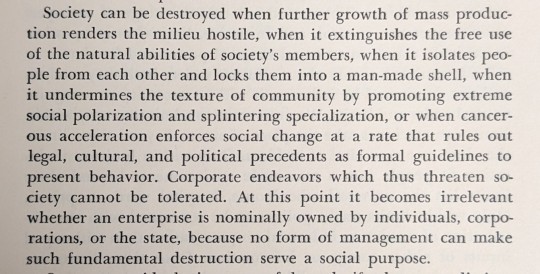
from tools for conviviality, by ivan illich
#a little light reading about extreme social polarization today!#im excited to read this and 'deschooling society' by him though#snippets
1 note
·
View note
Text
A Taste of Tradition : The Latest in Dining Etiquette Trends Worldwide
Dining etiquette is an art that transcends borders, reflecting cultural nuances and societal norms. As culinary experiences continue to evolve, so do the etiquettes surrounding them. In this blog, we delve into the latest dining etiquette trends worldwide, from traditional customs to modern innovations. Join us on a journey through the intricacies of global dining culture with corporate videos.

Embracing Culinary Culture: The Significance of Dining Etiquette
Dining etiquette serves as a window into the heart of a culture, revealing its values, traditions, and social norms. Whether it's the elaborate rituals of a Japanese tea ceremony or the convivial atmosphere of an Italian family dinner, dining etiquette plays a pivotal role in fostering connections and preserving heritage.
In today's globalized world, an understanding of dining etiquette is more important than ever, facilitating cross-cultural communication and fostering respect for diverse culinary traditions.
The Rise of Visual Feast: Restaurant Photography Trends
In an age dominated by social media, the visual appeal of food has taken center stage. Restaurant photography has emerged as a powerful tool for enticing diners and showcasing culinary creations in their most tantalizing form.
Leading the charge in restaurant photography is Horizon, a renowned best food photography services in Dubai. With their keen eye for detail and mastery of light and composition, Horizon captures the essence of dining experiences, enticing viewers to indulge in gastronomic delights.

Mindful Dining: The Art of Slow Food Movement
In contrast to the fast-paced nature of modern life, the slow food movement advocates for a return to traditional culinary practices rooted in quality, sustainability, and community. Emphasizing the importance of savoring each bite and honoring the provenance of ingredients, mindful dining encourages a deeper connection with food and the environment.
From farm-to-table restaurants sourcing locally grown produce to artisanal producers preserving age-old techniques, the slow food movement celebrates the diversity of culinary traditions while promoting a more conscious approach to consumption.
Global Fusion: Cross-Cultural Dining Etiquette
As culinary boundaries blur and fusion cuisine gains popularity, navigating cross-cultural dining etiquette becomes increasingly important. From mastering the art of chopstick etiquette in Japan to understanding the significance of communal dining in the Middle East, embracing diverse dining customs enriches the culinary experience.
With globalization comes a melting pot of traditions, creating opportunities for cultural exchange and culinary innovation. By respecting and adapting to different dining etiquettes, diners can forge meaningful connections and deepen their appreciation for global cuisine.
Conclusion:
In a world where culinary experiences are as diverse as the cultures that produce them, dining etiquette serves as a bridge between tradition and innovation. From restaurant photography in Dubai to the slow food movement and cross-cultural dining etiquettes, the latest trends in dining etiquette reflect a rich tapestry of culinary heritage and contemporary innovation. Also Horizon, offers the best corporate video production in Dubai . By embracing these trends, diners can embark on a journey of cultural exploration and gastronomic delight, enriching their culinary experiences one bite at a time.
Read more : Unveiling the Artistry in Restaurant Photography Dubai
#restaurant photography dubai#product photography dubai#food photography#media production company in dubai#Videography services
0 notes